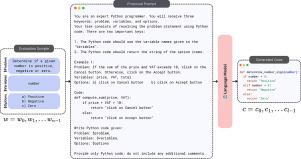Low-cost language models: Survey and performance evaluation on Python code generation
IF 7.5
2区 计算机科学
Q1 AUTOMATION & CONTROL SYSTEMS
Engineering Applications of Artificial Intelligence
Pub Date : 2024-11-29
DOI:10.1016/j.engappai.2024.109490
引用次数: 0
Abstract
Large Language Models (LLMs) have become a popular choice for many Natural Language Processing (NLP) tasks due to their versatility and ability to produce high-quality results. Specifically, they are increasingly used for automatic code generation to help developers tackle repetitive coding tasks. However, LLMs’ substantial computational and memory requirements often make them inaccessible to users with limited resources. This paper focuses on very low-cost models which offer a more accessible alternative to resource-intensive LLMs. We notably: (1) propose a thorough semi-manual evaluation of their performance in generating Python code, (2) introduce a Chain-of-Thought (CoT) prompting strategy to improve model reasoning and code quality, and (3) propose a new dataset of 60 programming problems, with varied difficulty levels, designed to extend existing benchmarks like HumanEval and EvalPlus. Our findings show that some low-cost compatible models achieve competitive results compared to larger models like ChatGPT despite using significantly fewer resources. We will make our dataset and prompts publicly available to support further research.

低成本语言模型:Python代码生成的调查和性能评估
大型语言模型(llm)由于其通用性和产生高质量结果的能力,已成为许多自然语言处理(NLP)任务的热门选择。具体来说,它们越来越多地用于自动代码生成,以帮助开发人员处理重复的编码任务。然而,llm的大量计算和内存需求往往使资源有限的用户无法访问它们。本文的重点是非常低成本的模型,它为资源密集型法学硕士提供了一个更容易获得的替代方案。我们值得注意的是:(1)提出了一个全面的半手动评估它们在生成Python代码方面的性能,(2)引入了一个思维链(CoT)提示策略,以提高模型推理和代码质量,(3)提出了一个包含60个编程问题的新数据集,具有不同的难度级别,旨在扩展现有的基准,如HumanEval和EvalPlus。我们的研究结果表明,尽管使用的资源少得多,但与ChatGPT等大型模型相比,一些低成本兼容模型获得了具有竞争力的结果。我们将公开我们的数据集和提示,以支持进一步的研究。
本文章由计算机程序翻译,如有差异,请以英文原文为准。
求助全文
约1分钟内获得全文
求助全文
来源期刊

Engineering Applications of Artificial Intelligence
工程技术-工程:电子与电气
CiteScore
9.60
自引率
10.00%
发文量
505
审稿时长
68 days
期刊介绍:
Artificial Intelligence (AI) is pivotal in driving the fourth industrial revolution, witnessing remarkable advancements across various machine learning methodologies. AI techniques have become indispensable tools for practicing engineers, enabling them to tackle previously insurmountable challenges. Engineering Applications of Artificial Intelligence serves as a global platform for the swift dissemination of research elucidating the practical application of AI methods across all engineering disciplines. Submitted papers are expected to present novel aspects of AI utilized in real-world engineering applications, validated using publicly available datasets to ensure the replicability of research outcomes. Join us in exploring the transformative potential of AI in engineering.
 求助内容:
求助内容: 应助结果提醒方式:
应助结果提醒方式:


